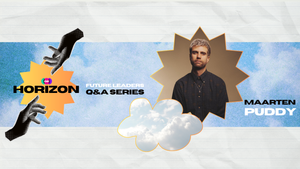As part of our Horizon Future Leaders series of interviews, we are connecting with the music industry’s next generation of leaders to gather candid advice and insights into their career journeys.
This week we caught up with Maarten Puddy, artist manager and founder of VOWTA Management.
While studying at university, Maarten threw himself into every opportunity he could find, volunteering in a recording studio, hosting a radio show, working for a promotions company and even learning to DJ himself.
That early, hands-on experience gave him a wide view of the industry and helped him figure out where his skills could make the biggest impact. Today, he manages DJs, producers, songwriters, live acts and visual artists, drawing on lessons learned by doing the work from the ground up.
His advice for those starting out? Grab all the experience you can, go to events and build relationships. For dance music especially, he highlights working as an artist liaison at clubs and festivals as a great way to connect with artists, managers and agents.
👇 Keep reading for Maarten’s reflections on starting a company, learning by doing, and why you shouldn’t be afraid to fail.
What’s your current role in the music industry?
I’m a company founder/owner and artist manager. I founded VOWTA Management in January 2024 and am an entertainment manager for DJs, producers, singers, songwriters, live acts and visual artists.
What does your general day-to-day look like?
Emails, calls and meetings. The day-to-day isn’t glamorous, but can be really fun and social. There are lots of moving parts to artists’ careers including releases, tours, contracts and deals, merchandise, etc, so it’s mostly managing all of these individual projects.
What steps did you take early in your career to gain experience and build skills to get you where you are now?
Experience, experience, experience. I realised before going off to university that I wanted a career in music and, for someone who wasn’t very musical but with a passion for music, I understood I needed to take every opportunity I could.
Exploring what roles there were within the music industry was also key to figuring out where my skill set could be put to best use, as there are lots of roles and opportunities for lots of people with different skills.
What opportunities did you explore early on that were particularly valuable?
Whilst at university, I volunteered in a recording studio, I had a radio show, I worked for a promotions team, I learnt how to DJ and I started to gain my first work experience in the music industry.
Being in an office with a promotions team taught me how the wider industry works and how to conduct myself in an office environment.
Has the opportunity landscape changed since then?
Companies still have work experience and internship opportunities where you can learn from more senior people within the industry, but there are also more opportunities than ever for everyone to go and do it themselves.
Are there any specific internships, projects, or initiatives that you would recommend to newcomers looking to pursue a similar role?
Any internship at a major label will open lots of doors, even if not initially, but further down the line. Other internships at large booking agents, promoters, labels, publishers, management companies, etc, are all very much worth doing for a similar reason. Experience in different areas of the industry will always help.
What advice do you have for building and leveraging a professional network in the music industry?
Go to events and meet people. Whether it’s a small gig, a festival, a professional event, an industry mixer, or a label release party - get out there and meet people.
For dance music in particular, I always believed that being an artist liaison at clubs, venues and events that book headline DJs was a great way to meet artists, managers, agents and their teams. Events are the cornerstone of the dance music industry, so go out there and meet people.
How has the evolving digital landscape impacted your role, and where do you focus to stay ahead?
Everything is driven through social media, how you market yourself, break records, have cultural moments and your ability to reach new audiences. Staying on top of the platforms and how to engage with younger audiences will allow any person within the industry to stay ahead of the game.
What trends or changes do you see on the horizon for the music industry, and how can early career professionals prepare for them?
People have noticed that the industry isn’t relying solely on data to sign their next acts, so artists should go out there, create amazing music, find a community, play gigs and impact their part of culture - the industry will follow.
What’s one piece of advice you wish someone had given you at the start of your career?
Don’t be afraid of starting companies and failing; go out there and just do it!

